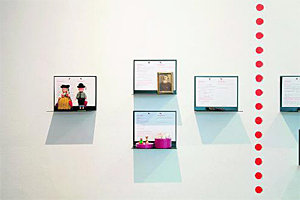Doing Kinship with pictures and objects
Using ethnographic and artistic methods, the aim of the project is to look at practices of doing kinship with pictures and objects. From this empirical starting point, experimental new ways of researching, of representing and of participatory communication will be developed in conjunction with the Austrian Museum of Folk Life and Folk Art in Vienna. In relation to the investigation of family and kinship today, the project draws on recent developments in cultural studies and social science theory e.g. J. Carstens ideas of "doing kinship", in creating the understanding of the notion of family and kinship as part of an everyday cultural process, and on the current finding of an enlargement and unbounding of kinship.
Kinship studies
With this approach, the project focuses on the formation and production of relationships within a familial grouping and the creation of kinship groups through visual culture and material means. This is addressed by looking at the ways these public/private relationships are produced, named, legitimised, arranged within a hierarchy, represented through pictures, objects, films etc. The project attempts to analyse these issues through the use and employment of ethnographic research methods in two adjacent districts, namely that of the 8th (Josefstadt) and 16th (Ottakring) districts, in Vienna. These two districts are thought to have different socio-economic backgrounds, with the 16th housing a predominantly working class population with a large proportion of these coming from a migrant background, in contrast the 8th would be considered to be an upper or middle class district with a lower percentage of the population stemming from a migrant background. The project intends to interpret the use of photographs/pictures and other objects as a popular aesthetic practice of family and kinship. Due to current debates in cultural studies as to the limitations of verbal/written representations of visual and material culture, the project combines qualitative ethnographic study methods with artistic analysis. This approach to socio-cultural analysis is in keeping with current perspectives of social/cultural anthropology and cultural studies which suggest that the dynamics and relationships within a family or kinship grouping must be looked at in a holistic manner, encompassing verbal, spatial, material and visual areas in order to look at the interaction of these aesthetic forms (e.g. photographs of family in wallets, or distribution of photos and videos either online or in hardcopy to kin around the world).
Research in the museum laboratory
The central research space of this project will be an experimental laboratory in the Austrian Museum of Folk Life and Folk Art in Vienna, as it specialises in the collection and preservation of informal popular culture. The laboratory links cultural-studies researchers with museum curators, mediators, artists, the producers and users of the given pictures and objects, with the aim of working together. The curators will bring in objects from their collections in order to confront the visual and material culture hidden in storage with objects that are currently used by the persons participating in the project. This will create a new space which allows an experimental dynamic to unfold in relation to display and interplay between theory and art. It also allows for the development of new curatorial possibilities and museological work, and aims to develop new participatory methods of communication and mediation between museums and the public. With this the project focuses on material and visual aspects of culture, in order to transcend a cultural analysis which predominantly concerns itself with language, and to develop the idea of aesthetic, popular and research practices within the bounds of a museum's cultural and social mediation programme
Project Management: Prof. Dr. Elisabeth Timm
Team: Kathrina Dankl MSc, Mag. Tena Mimica, Lukasz Nieradzik MA (Mag. Andrea Hubin, Mag. Ana Ionescu until August 2010), Mag. Karin Schneider
Project Partner: Univ. f. angewandteKunst (Prof. Dr. Alison Clarke), Östereichisches Museum für Volkskunde (HR Dir. Dr. Margot Schindler), Universität Wien (Ass.-Prof. Dr. Bernhard Fuchs)
Funded by: WWTF art(s) & sciences-Call 2008

